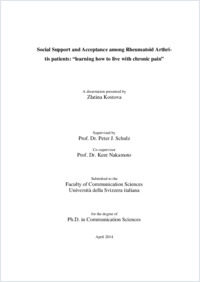Social support and acceptance among rheumatoid arthritis patients : “learning how to live with chronic pain”
- Kostova, Zlatina
- Schulz, Peter J. (Degree supervisor)
-
11.06.2014
150 p.
Thèse de doctorat: Università della Svizzera italiana, 2014 (jury note: Magna cum laude)
English
Chronic pain sufferers with diseases such as Rheumatoid Arthritis (RA) are a category of patients that feels stigmatized, lacking understanding and support from the surrounding social environment (Davison et al., 2000). The invisible and unpredictable character of RA makes it very difficult to be recognized and understood by family, friends, colleagues, and so on, and patients often complain of being treated with scepticism and distrust. In the last 25 years, the concept of social support and its relation to health has been studied by a burgeoning literature (see, inter alia, Krokavkova et al., 2008; Helgeson, 2003; Lee et al., 2004). There is strong empirical evidence that the support that chronic patients receive from their environment is fundamental for the way they cope with physical and psychological suffering. Nevertheless, in the case of RA, providing the right social support is still a challenge and such support proved to be often elusive and unreliable in helping patients to manage the disease (Kostova et al., 2014). Acceptance is an important component of pain management, being associated with improved quality of life and lower levels of pain and depression. According to McCracken (2005), acceptance is not a single belief but a psychological process, driven by the willingness to experience pain without trying to control and avoid it. Patients able to pursue their life goals and the activities that matter to them, regardless of the pain, have better quality of life and better physical, social and emotional functioning (Geiser, 1992; McCracken and Eccleston, 2005; Viane et al., 2003). There is therefore ample reason to suppose that, in facing and accepting the implications of a disease like RA, patients need access to a satisfying social context on which they can rely for both emotional and practical support (McCracken, 2005; Revenson, 1993). However, specific evidence on the link between social support and acceptance, especially in a context like RA where that social support is harder to realize, is as yet missing. This dissertation is a collection of three papers that aim to overcome the aforementioned challenges, giving both breadth and depth to explanations of the relationship between social support and acceptance among RA patients. With the first paper, we defined a ‘key moments’ model of acceptance, exploring five moments or phases that RA patients experience in order to accept and accommodate the pain in their selves and lives. We identified the diagnosis, the first phase, as a particularly difficult step among RA patients that shapes the whole process of acceptance. The second paper is focused on the concept of social support, comprehending its multifaceted character. We identified the main social support sources from patients’ point of view and the circumstances under which the reactions from these sources may hinder rather than help acceptance. While we were able to link each source of support to particular phases of acceptance, identifying in which key moments the different sources do most to foster acceptance, the results were more holistic than that: the most effective sources can be helpful throughout the process. In the third paper, building on the insights of the first two, we describe and evaluate an online tool designed to be an alternative way of providing social support to chronic pain patients. Identifying both where this tool was and was not effective, we pinpoint the factors – at the level of design and at the level of the individual patients – that moderate the efficiency of online social support. This dissertation provides theoretical and clinical advances to research on the concepts of acceptance and social support and the link between the two. A qualitative approach allows us not only to consider the richness and variety of patients’ perspectives but also to do justice to the multidimensionality of both concepts. The findings of the dissertation have practical implications, providing health professionals with insights into the kind of support needed to help sufferers down the difficult path towards acceptance. From a theoretical point of view, the dissertation contributes to the field of health communication in two ways. First, via a grounded theory approach we build on existing understandings of the multi-phasic and complex process of acceptances. Second, we ground the concept of social support in the model of Health Empowerment (Schulz & Nakamoto, 2005), identifying it as a fundamental factor that affects patients’ self-management behaviour.
- Language
-
- English
- Classification
- Medicine
- License
-
License undefined
- Identifiers
-
- RERO DOC 210349
- URN urn:nbn:ch:rero-006-113095
- ARK ark:/12658/srd1318422
- Persistent URL
- https://n2t.net/ark:/12658/srd1318422
Statistics
Document views: 367
File downloads:
- Texte intégral: 143
